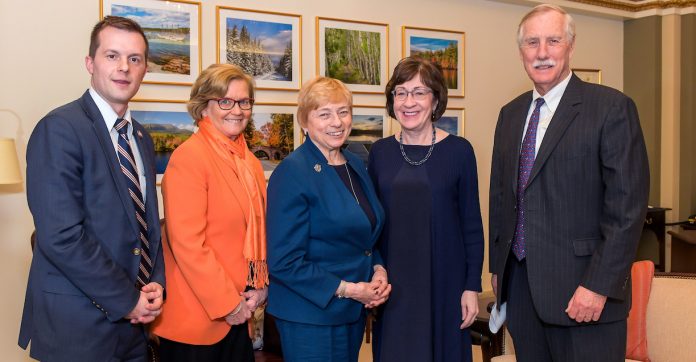
[This story appears in the March/April 2020 issue of Boston Spirit magazine. Subscribe for free today.]
In June 2014, a few months before nearly two-thirds of Maine voters sent US Senator Susan Collins back to Washington, Collins came out as one of four Republican Senators to support marriage equality—just after the Human Rights Campaign endorsed her reelection.
Then-HRC President Chad Griffin, in his announcement, said, “Senator Collins has played a pivotal role in advancing support for LGBT equality—from her dogged support for the repeal of ‘Don’t Ask, Don’t Tell,’ to her critical vote for the Employment Non-Discrimination Act last year, to her proud support for marriage equality, HRC is proud to stand with Senator Collins, and with allies on both sides of the aisle like her.”
Since her first election to the Senate in 1996, working across the aisle has been a specialty of Collins, now in the last year of her third term and seeking a fourth. Her votes have earned her the distinction of “the most bipartisan” senator from the Lugar Center and Georgetown University’s Bipartisan Index.
But the aisle between the parties has become wider, working across it more challenging.
This challenge for Collins is especially clear on HRC’s most recent Congressional Scorecard, which rates how elected officials have voted on issues of LGBTQ equality. For the two previous sessions, Collins scored a respectable 85 out of 100. But then her score plummeted to 33.
Compare that to her fellow Independent Maine Senator Angus King’s scores of 90 and 90 for the two previous sessions, or by contrast Kentucky Senator Mitch McConnell’s 0 and 20, out of the possible 100. As Collins’ score fell to its current 33, the scores of King and McConnell, both comparatively party-line voters, remained a relatively steady 88 for King, and back down to zero for McConnell.
While Collins has remained “most bipartisan,” the Republican party, under the Trump administration, has pulled dangerously farther from any support it may have previously shown for LGBTQ people. As Sean Cahill, director of health policy research at The Fenway Institute put it, “During Donald Trump’s third year as president, we moved from worrying that anti-LGBT policies would harm people to seeing the damage of these policies in action.”
On her record
Matt Moonen, executive director of EqualityMaine, said what troubles him the most are Collins’ recent votes to confirm the Trump-appointed federal judges with anti-LGBTQ records. While her vote to confirm Brett Kavanaugh to the US Supreme Court has garnered the most attention—especially alarming, given the shift it represents on the high court—Moonen says he’s equally worried about the “dozens and dozens of nominations at the circuit court, with ACLU ratings that are awful.”
To her credit, Collins has stood up against some of these nominees. In November 2019, for example, she cast the sole Republican vote against White House lawyer Steven Menashi’s appointment to the New York–based 2nd US Circuit Court of Appeals, who “has made a career of promoting anti-LGBTQ rhetoric,” said current HRC President Alphonso David.
Despite her vote against him, however, Menashi was confirmed by the Senate.
“Historically, the expectations we have had of her is as a moderate, part of that being pro-LGBTQ equality,” said Quinn Gormley, executive director of MaineTransNet. “In years past, her record on LGBTQ equality has been quite strong.”
“But in the last couple years, there’s been a substantial shift in how her office responds to LGBTQ organizations and movements,” Gormley said. “We have found her less accessible as our Congressional representative [than Senator King and Congresspersons Chellie Pingree and Jared Golden].”
When President Trump tweeted out his transgender military ban in January 2019, for example, “we had all of the others on the phone within an hour—particularly Golden, also a moderate,” Gormley recalled, though Collins joined King in introducing a post-Tweet bipartisan bill to protect trans service members.
On this and other issues, it would go a long way, Gormley said, for Collins to attend a town hall meeting on LGBTQ issues, as the others have done. “So much LGBTQ advocacy relationship-building is done through storytelling, face-to-face time not possible only through the office.”
Gormley added that more office sessions with Collins and her staff would be appreciated, too.
Reaching out
Boston Spirit repeatedly reached out to Collins’ offices both in Maine and in DC, and we will continue to do so. Each time so far, her press office has declined our request to speak with the senator. We want to ask her how she squares her voting record over the past three years with her strong record of LGBTQ support.
To get specific:
We’d like to ask her to explain her votes for federal judges poised to dismantle hard-won, pro-LGBTQ legislation, much of which she supported.
We’d like to ask her about her confirmations of now-former US Attorney General Jeff Sessions, SCOTUS Justices Neil Gorsuch and Kavanaugh and US Circuit Judge Stuart Kyle Duncan.
We’d like to ask why she opposes the Do Not Harm Act, which wound ensure that federal law designed to protect religious liberty would not be used to deny basic civil rights; or federal anti-conversion-therapy legislation; or anti-public-school-bullying laws; or the International Human Rights Defense Act; or antidiscriminatory voting rights regulations; or a nondiscrimination bill to protect LGBTQ students in public schools.
Not all of Collins’ recent votes, like the one against Menashi, have been bad for LGBTQ people; quite the opposite, for quite a few.
She opposed the appointment of Education Secretary Betsy DeVos and DeVos’s withdrawal of protections for LGBTQ public school students. Unlike her stand against Menashi and DeVos’s appointment, some of Collins’ votes have made a real difference too. She stood with Senator John McCain to uphold the Affordable Care Act, whose ban would have blocked health care access for many LGBTQ people and people living with HIV. She defended federal funding for family planning grant recipients like Planned Parenthood. She also supported LGBTQ nondiscrimination bills in housing and credit. Collins was the first senator (and lead GOP sponsor) to sign onto the comprehensive LGBT nondiscrimination Equality Act of 2019.
Maine’s Democratic primary is scheduled to take place on June 9. Then we should know if Collins’ challenger will be one of four pro-LGBTQ candidates: Maine Speaker of the House Sara Gideon; Ross LaJeunesse, the openly gay and Victory Fund–endorsed former advisor to Senator Edward Kennedy; long-time activist and political organizer Betsy Sweet; or attorney/activist Bre Kidman, the first openly nonbinary person to run for US Senate.
One thing we do know: Senator Collins is in for a tough race.
Not a subscriber? Sign up today for a free subscription to Boston Spirit magazine, New England’s premier LGBT magazine. We will send you a copy of Boston Spirit 6 times per year and we never sell/rent our subscriber information. Click HERE to sign up!








